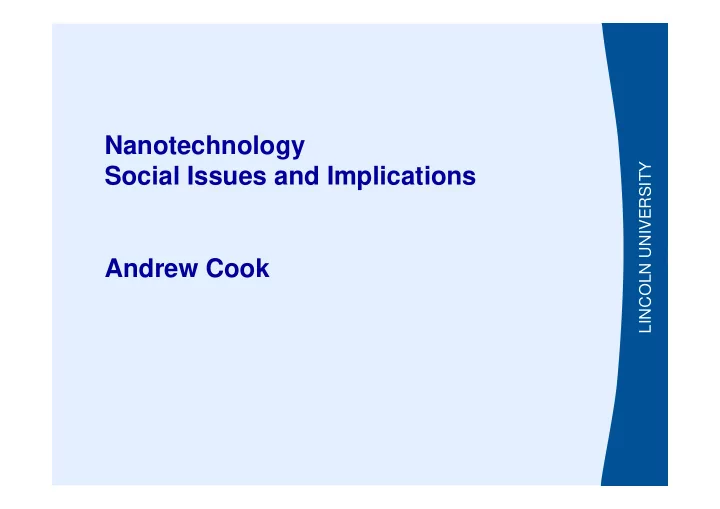

Nanotechnology LINCOLN UNIVERSITY Social Issues and Implications Andrew Cook
Rationale LINCOLN UNIVERSITY In light of public concern over genetic modification there is a need to pre- emptively gauge and understand public reactions to nanotechnology so as to usefully inform science and industry, as well as resource policies and research programmes.
General Aim and Objectives LINCOLN UNIVERSITY • Predict public reactions to, and their implications for, nanotechnology. • Provide guidance for processes of interaction between scientists, policymakers and the public.
Specific Aims of this Paper LINCOLN UNIVERSITY Investigate the following topics: • Values associated with nature. • Perceptions of risk. • Concern over privacy. • Concern over perfect people. • Changing attitudes and ethics.
Method • Panel focus groups and guided discussion LINCOLN UNIVERSITY • Three weekly one hour meetings which involved – General discussion of current issues – Education – Consideration of nanotechnology scenarios
Recruitment LINCOLN UNIVERSITY • Three local primary schools provided adult participants. • Participating primary schools were selected to represent a range of deciles. • Schools were paid NZ$300 and each participant was paid NZ$60. • Participants were adults involved with the school or living in the local area. • A balance of gender was sought, as well as participants of various ages. • Overall there were 32 participants.
Values associated with nature LINCOLN UNIVERSITY • I don’t think there really is a balance of nature, but making new things won’t help. • The more technology, the more change to the environment and more problems. • The environment can only handle so much meddling. • It’s wrong to play god with nature. • Everything we do affects the environment. The important thing for us is to be conscious of it and decide for the better and realise that some things we do aren’t for the better.
Perceptions of risk • Fluoride, Thalidomide and the DDT poison were huge LINCOLN UNIVERSITY mistakes. We’ve had some catastrophes. Various medications have caused issues along the way, lots and lots of things. I’m not saying not to move forward. I’m just saying caution all the way along. • Scientists can only estimate the risk about things they can measure. Its what they can’t predict - that’s the problem • No one really has much idea of the kind of world technology is thrusting upon us. • The scientists don’t think about making something out of it, they don’t think what it’s for, they just get excited.
Concern over privacy - Identity chips • I don’t have a problem with it. You only have a problem if LINCOLN UNIVERSITY you have something to hide. • It’s very big brotherish and very much open to abuse. • They wouldn’t give a rats about ya. • Older people remember during the Second World War there were certain people in Europe who had to carry ID cards and that was because they were considered lesser people. • They have been against it in the UK but now with terrorism people might see it differently.
Concern over perfect people • It’s about keeping everybody perfect. LINCOLN UNIVERSITY • The philosophy of Hitler. • It’s like being a machine, where will it stop. You can do the whole body, why stop at arms. • It’s really sci-fi stuff but it’s exciting to repair the eyes or hearing or re-grow limbs or fix Alzheimer’s. We would all be perfect though is that a good thing. • I’m thinking of the Borg and everyone has access to the best info but you’re all living on the same level as each other. In Star Trek this was a frightening thing and maybe it would be in reality as well.
Changing attitudes and ethics • Gradually we readjust ourselves and our thinking as we LINCOLN UNIVERSITY move along. We are readjusting. • We are basically just flexible characters and whilst what shocked us earlier, or knocked us out of our comfort zone, for one reason or another, something else comes along so we adjust to that and on we go again. • It’s the fear of the new. There’s a certain built in resistance in all of us to accept change. • I love the idea of progression and technology and things but we don’t give it enough time to try it. We really need a life time, perhaps two generations, but scientists cannot wait. • It’s already here and from the scientists’ point of view it’s going to happen no matter what. Why are we having these discussions if they are doing it anyway?
Implications • If nanotechnology is seen to threaten nature then a resolute negative attitude is likely to develop. LINCOLN UNIVERSITY • Emphasis given to unforeseen risks suggests opposition to nanotechnology would involve a call for a precautionary approach. • Medical developments from nanotechnology were acceptable but there is likely to be a fear of the enhancement of human abilities. • Use of identity chips was not an important concern for the participants possibly because of recognition of the need for security against crime or terrorism. • While encouraging for nanotechnology, the possibility for change in attitudes and ethics should be treated with caution. It does not necessarily follow that change occurs in the short term.
Recommend
More recommend